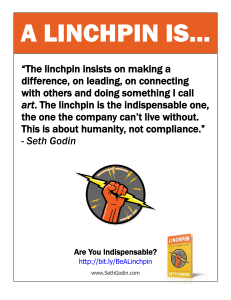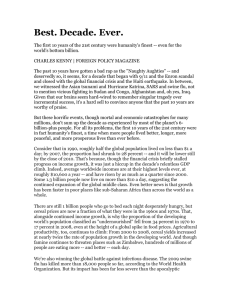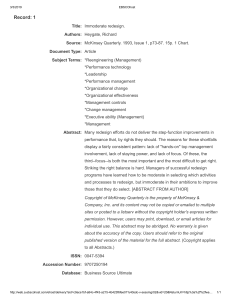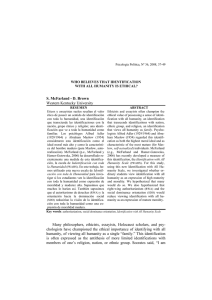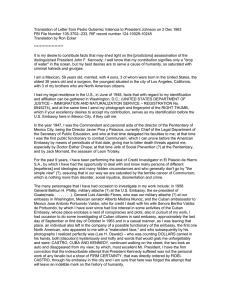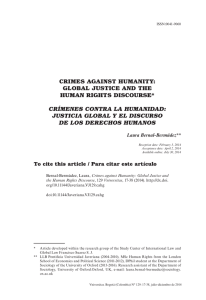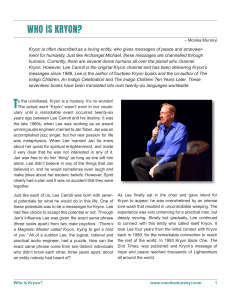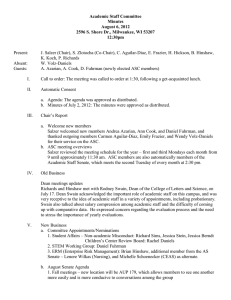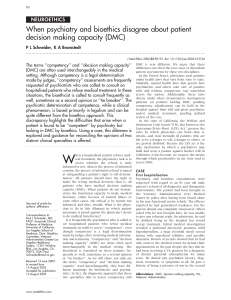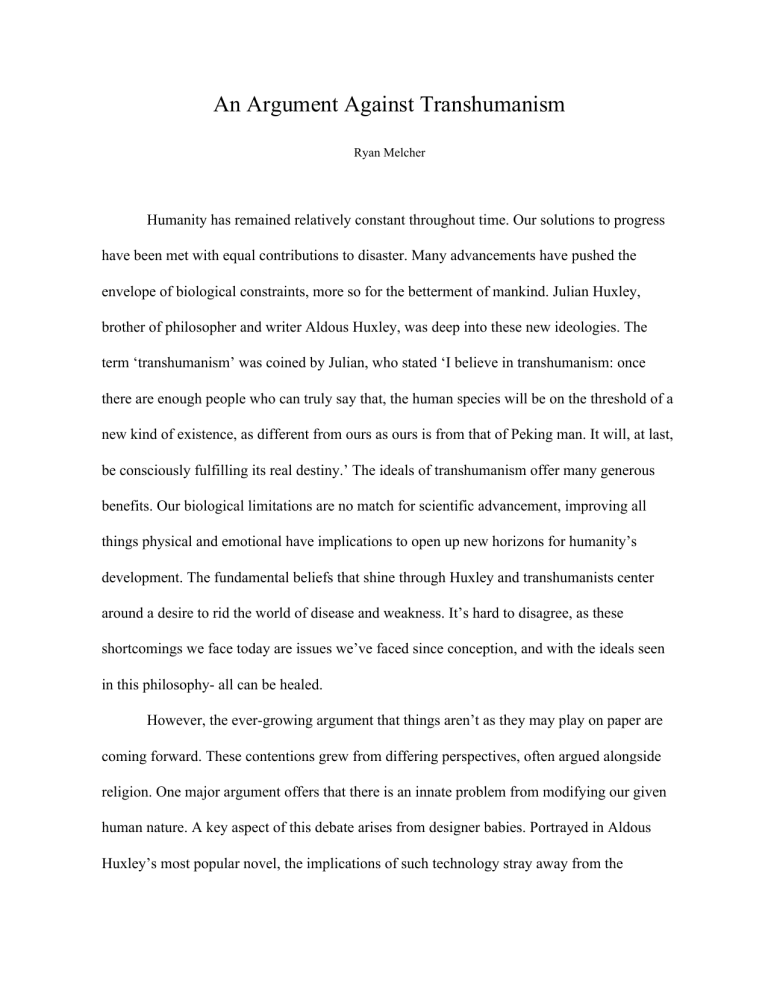
An Argument Against Transhumanism Ryan Melcher Humanity has remained relatively constant throughout time. Our solutions to progress have been met with equal contributions to disaster. Many advancements have pushed the envelope of biological constraints, more so for the betterment of mankind. Julian Huxley, brother of philosopher and writer Aldous Huxley, was deep into these new ideologies. The term ‘transhumanism’ was coined by Julian, who stated ‘I believe in transhumanism: once there are enough people who can truly say that, the human species will be on the threshold of a new kind of existence, as different from ours as ours is from that of Peking man. It will, at last, be consciously fulfilling its real destiny.’ The ideals of transhumanism offer many generous benefits. Our biological limitations are no match for scientific advancement, improving all things physical and emotional have implications to open up new horizons for humanity’s development. The fundamental beliefs that shine through Huxley and transhumanists center around a desire to rid the world of disease and weakness. It’s hard to disagree, as these shortcomings we face today are issues we’ve faced since conception, and with the ideals seen in this philosophy- all can be healed. However, the ever-growing argument that things aren’t as they may play on paper are coming forward. These contentions grew from differing perspectives, often argued alongside religion. One major argument offers that there is an innate problem from modifying our given human nature. A key aspect of this debate arises from designer babies. Portrayed in Aldous Huxley’s most popular novel, the implications of such technology stray away from the ‘God-given’ aspects most religions point to for our distinct characteristics. Joel Thompson, writer and professor, states it’s this need to ‘master the mystery of birth’ which destroys the bond between a parent and respective child. Thompson argues that it’s the different perspective of price, the one of monetary value, that would keep this at bay, stating, ‘The initial high cost, availability, risk and uncertainty about life-extending therapies is likely to curtail the number of people in the world who will pursue it.’ Later going onto talking about cosmetic surgery, for example, being in demand of only those who can afford it. I argue, that even with the minority of the rich having access, the effect would be dramatic. Envisioning a world where dictators and those in control have the option to never leave office so long as they never die would be frightening. The power that is already possessed would only exponentiate. Huxley agrees with Thompson on the issue of designer babies, with both being skeptical of the humility of chance and pure humanity seen with a newborn. Pushing boundaries is fundamental to humanity’s growth, but the bounds of human nature are sensitive and often abused. The most prominent thesis to what defines transhumanism is the idea that one-day humans will be able to transform into something vastly enhanced from our current condition that these new forms will no longer be able to be considered ‘humans’. Humans are different than any other animal that has or is roaming the Earth- the language that brought self-conscious behavior and teaching has allowed humanity to grow farther and wider than any previous contender. Studies have often pointed their attention to discovering the Earth, the living cells and their main components that comprise of all life in the universe… yet the subject of human nature had yet to be fully understood. The human race has yet to discover all of its potentials, the act of introducing technology to humanism is only going to propel this strife. Huxley wrote his essay and developed these ideas without the presence of many of the modern-day technologies we have today. The introduction of biomechanics and research into the connection between digital space has only lead to more questions. Humans have learned that through technical advancements wonders once thought to be unsolvable are being not-so. With each stride in scientific pose comes a concerning outlook on the negative effects of transhumanism. In its deepest sense, transhumanism poses more of a threat than a benefit to society. The argument between transhumanists and bioethics often finds itself struggling between shared core beliefs. Transhumanists share that human biology is capable of being improved and it’s at the benefit of all humanity. As ethicist Tom Koch writes, it’s these advancements that allow ‘science to fix our failings’. A point of interest arises when the implications of such are truly implemented. Koch explains that the scientists in charge of changes in genomes would understand which ones to be promoted and which should be eliminated. The future of humans are those that can be treated as machines. With parts being replaced and changed with every new iteration, outdated mechanisms and therefore, people, being left in the dust. Koch states many past happenings where there were ‘forced sterilization of defectives’ . The services under this euthanasia craze even garnered enough attention for a 1927 court case, in which it was legalized to sterilize women who contain undesirable traits. Now, it is expressed by Koch that modern-day eugenics at least for a large part disparage these past actions. Nevertheless, it is hard to believe that history won’t repeat itself with different but eerily similar cases. Notably, Francis Fukuyama, Professor of International Political Economy at Johns Hopkins School of Advanced International Studies, has aimed his sights at transhumanists and believes they are a detriment to society. Being on the President’s Council of Bioethics, Fukuyama states, “Underlying this idea of the equality of rights is the belief that we all possess a human essence that dwarfs manifest differences in skin color, beauty, and even intelligence. This essence, and the view that individuals therefore have inherent value, is at the heart of political liberalism. But modifying that essence is the core of the transhumanist project.” These statements by Fukuyama are only some of the many implications of the social and political changes seen through the use of technology to dramatically increase our capabilities. A clear example of these future dreams of transhumanists is nanotechnology. Author Richard A.L. Jones writes, “At a stroke, it is predicted, this will end scarcity – any material or artefact, from the most basic commodities to the most precious objects… Replacement parts for humans will be simple to make, and will have capabilities that hugely exceed their natural prototypes. Everything – the economy, the environment, even what it is to be human – will be utterly transformed.” A cog in a wheel of the corporate machine, man will become slaves not only to the devices of their own will, but to the mechanics that make up the core functions of their body. Through these advancements, humanity reaches a crossroads, the exponential growth of science in technology have led man to destroy the ailments of disaster and disease. At a cost, the same offspring of these changes lead to the same gadgets that hijack our livelihoods, develop unhealthy habits in our lives such as the abundance of screen usage and sleepwalking through life. Our lives become part of the same machines our bodies would connect to, constantly racing in neverending strife for innovation, making each day harder to be in the present. Humanity was brought upon by chance. A glimpse of a future where instead we rule by choice has become an interesting yet destructive force to reckon with. This evitable change to a future ruled by such technology will further propagate that humans are vulnerable beings, built from a rich and unique human nature. The race for the unknown may lead to the loss of what humans all inherently understand. Humanity was built by struggle, evolution brought us through the ages and has consistently been related to our well-being. Underlying this idea is the equality of rights, the belief that we all possess a human essence manifests itself through our distinctive skin color, beauty, intelligence, and well being. This essence, and the view that individuals therefore have inherent value, is at the heart of political liberalism, and modifying such aspects of our nature is the core principle of transhumanism. If we start transforming ourselves into something superior, what rights will these enhanced beings claim, and what rights will they possess when compared to those left behind, and debates on whether these humans left behind will even afford not to follow. These prospects are seen even within our own communities here in Nebraska, and the implications of those third world countries who do not possess the riches we do will be left further behind than we could ever imagine. Menacing ideals for the transhumanist are the same moral standards that have consistently pushed the lower class systems to oblivion. Besides, humans were created as resilient beings. The idea of antifragility is a topic of growing discussion, where it points to turmoil and shock as a means of growth in society. Author Scott Cendrowski writes about persistence in humanity, “In science it’s called hormesis, the concept that limited doses of a harmful substance tend to make organisms stronger, healthier, and prepared for a bigger dose next time.” Unlike the principle of hormesis, transhumanism wishes to rid humanity of these factors which allow for growth and strength. There are clear and present vices of living a life of pure leisure, Tim O’Brian writes, “Those who live in leisure struggle more with having any meaning in their life beyond the superficial. They also often have more difficulties with food, alcohol and drug issues.” There is a significant sense of gluttony when we are given a long break from our usual struggles. In an age of defining mental illness, many people have gained issues with depression and anxiety. Medicines can trick our bodies to altering chemical imbalances caused by these disorders, although the issue will never fully be solved unless approached at a different angle. The abundance of technology and improvement has directly correlated to the growth of mental disease. The utopian perspective is one that alludes to many, a world where disease and strife are threats of the past. However, I impose that society take a different approach to transhumanism, a view that shows the sinister and likely outcome of such technology. Hearing the siren call of transhumanism is one part, but another is understanding the broad and staggering impact that technology has on our lives today and will in the future. Works Cited Antifragility: How disorder makes us stronger. (n.d.). Retrieved from http://fortune.com/2012/12/14/antifragility-how-disorder-makes-us-stronger/ Bobryk, Jerzy (Author). Digital Dementia or the Explosion of Intelligence?: Artificial Intelligence, Computer Sets and Natural Man / Miklaszewska, Natalia. ; (Translator), 2015. Coenen, Christopher (Author). Transhumanism in Emerging Technoscience as a Challenge for the Humanities and Technology Assessment, 2014. Dumsday, Travis. “Transhumanism, Theological Anthropology, and Modern Biological Taxonomy.” Zygon: Journal of Religion & Science, vol. 52, no. 3, Sept. 2017, pp. 601–622. EBSCOhost, doi:10.1111/zygo.12346. Jensen, Steven J. “The Roots of Transhumanism.” Nova et Vetera (English Edition), vol. 12, no. 2, Apr. 2014, pp. 515–541. EBSCOhost, search.ebscohost.com.leo.lib.unomaha.edu/login.aspx?direct=true&db=a9h&AN=9713 7127&site=ehost-live&scope=site. Karlin, A., Khan, R., Unz, R., Unz, R., Sims, J. H., Blankfort, J., . . . Unz, R. (n.d.). Francis Fukuyama's latest article on transhumanism. Retrieved from http://www.unz.com/gnxp/francis-fukuyama-s-latest-article-on-transhumanism/ Koch, Tom. “Enhancing Who? Enhancing What? Ethics, Bioethics, and Transhumanism.” Journal of Medicine & Philosophy, vol. 35, no. 6, Dec. 2010, pp. 685–699. EBSCOhost, doi:10.1093/jmp/jhq051. Thompson, Joel. “Transhumanism: How Far Is Too Far?” New Bioethics, vol. 23, no. 2, July 2017, pp. 165–182. EBSCOhost, doi:10.1080/20502877.2017.1345092. “The Leisurely Life Is the Healthy Way to Live. What Is Wrong with a Life of Leisure?” Fredericksburg.com. Accessed April 8, 2019. https://www.fredericksburg.com/town_and_countycolumns/the-leisurely-life-is-the-hea lthy-way-to-live-what/article_10e1825e-6c62-51f4-8bb5-44d017ded62e.html. Why Transhumanism will be a blight on humanity and why it must be opposed. (n.d.). Retrieved http://www.privacysurgeon.org/blog/incision/why-transhumanism-will-be-a-blight-onhumanity-and-why-it-must-be-opposed/

